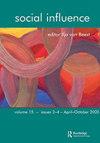Collective self-fulfilling prophecies: group identification biases perceptions of environmental group norms among high identifiers
IF 0.6
3区 心理学
Q3 PSYCHOLOGY, SOCIAL
引用次数: 25
Abstract
Abstract Previous research has shown that ingroup norms influence intentions to engage in pro-environmental behavior, most notably for individuals highly identified with a group. However, intriguingly, identification may itself lead people to exaggerate descriptive pro-environmental ingroup norms to enhance positive distinctiveness of their ingroup. We investigated this possibility in two studies together with the assumption that perceived norms would mediate the effects of identification on intentions to engage in pro-environmental behavior. The results support our assumptions and show that high identifiers perceived their ingroup be more eco-friendly, which in turn increased respondents’ intentions to behave in a pro-environmental manner. We discuss the implications of this collective self-fulfilling prophecy for social identity theorizing and the prediction of pro-environmental behavior.集体自我实现预言:高标识者群体认同偏差对环境群体规范的认知
摘要以往的研究表明,群体内规范会影响参与亲环境行为的意愿,特别是对于高度认同群体的个体。然而,有趣的是,认同本身可能导致人们夸大描述性的亲环境内群体规范,以增强其内群体的积极独特性。我们在两项研究中调查了这种可能性,并假设感知规范会调节认同对参与亲环境行为的意图的影响。结果支持我们的假设,并表明高标识符认为他们的内部群体更环保,这反过来又增加了受访者以亲环境方式行事的意愿。我们讨论了这种集体自我实现预言对社会认同理论化和亲环境行为预测的影响。
本文章由计算机程序翻译,如有差异,请以英文原文为准。
求助全文
约1分钟内获得全文
求助全文
来源期刊

Social Influence
PSYCHOLOGY, SOCIAL-
CiteScore
1.50
自引率
0.00%
发文量
4
期刊介绍:
Social Influence is a journal that provides an integrated focus for research into this important, dynamic, and multi-disciplinary field. Topics covered include: conformity, norms, social influence tactics such as norm of reciprocity, authority, scarcity, interpersonal influence, persuasion, power, advertising, mass media effects, political persuasion, propaganda, comparative influence, compliance, minority influence, influence in groups, cultic influence, social movements, social contagions, rumors, resistance to influence, influence across cultures, and the history of influence research.
 求助内容:
求助内容: 应助结果提醒方式:
应助结果提醒方式:


